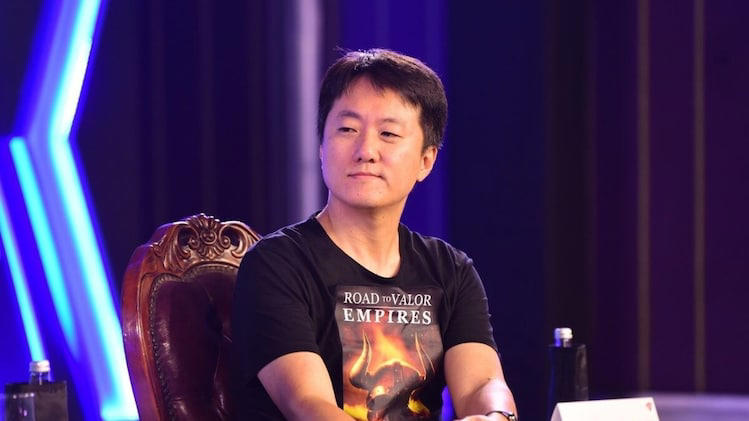


Prithhis Bose
Jul, 16.2024
CEO of Krafton India Sean Hyunil Sohn discussed the company's dedication to esports, cutting-edge technology like AI, and the booming Indian gaming business in an exclusive conversation with Tech Today.
Esports at the Base and a Booming Scene
The Battlegrounds Mobile India Series (BGIS), Krafton India's premier esports program, kicked off the discussion. Sohn said that BGIS is "the esports event for...grassroot players to...step up the ladder into the national scene, or even the top scene," expressing pleasure in the platform's role in developing up-and-coming talent. He underlined that the series has given players the much-needed motivation "to improve and compete."
Sohn also emphasized BGIS's accomplishment of drawing a sizable audience, pointing out the "good turnout in terms of audience." According to him, the event is "getting good reviews with a good attendance."
Using AI for Innovation and Productivity
Given the significance of AI and VR in the rapidly changing game industry, Pranav Dixit of Tech Today questioned Sohn regarding Krafton's strategy for fusing these technologies. Sohn disclosed that PUBG PC in virtual reality had been tested by Krafton earlier. Sohn emphasized that even if the project was eventually abandoned, the company is still dedicated to investigating innovative technologies.
"In the past, we worked on minor experimental projects like creating a VR version of PUBG PC. We gave that a try, but it wasn't very smooth, so we abandoned it. That was four or five years ago, which seems like a long time ago."
Sohn turned to artificial intelligence (AI) and noted two important applications of it: utilizing generative AI to speed up game creation and integrating AI into the core of gameplay.
He clarified, saying that "generative AI technology has made it cheaper and much smoother to conceptualize new game ideas. Conceptual artists are not really necessary anymore. To conceptualize and visualize your ideas for games, simply use DALL-E, diffusion, or similar tools."
While admitting that Krafton is not the only company using these apps, Sohn emphasized the company's focus on creating "AI bots within the game to provide a good gaming experience." He thinks that the gaming might be much improved by these AI bots.
Going further into Krafton's investigation into AI-powered gaming, Sohn disclosed an experimental endeavor named "Magic Mike," characterizing it as "a very experimental and small game." He went on, "We are attempting to create novel gameplay experiences that are made possible by artificial intelligence." We think that if that potential is realized, there will be a ton of chances for fresh gaming that were not feasible prior to this AI expertise."
Voice recognition technology is used in "Magic Mike". The AI module in the game recognizes certain "magic spells" that players yell into their microphones, and it uses that recognition to initiate particular events or actions.
Sohn also presented an experimental project: an AI bot that players engage with to solve a mystery in a mystery story game. Citing the popularity of their prior battle royale game, he acknowledged the potential for these kinds of games to gain traction.
Investment Strategy of Krafton: Partnerships and Acquisitions
Sohn also provided information about Krafton's financial strategies. He made it clear that they are relatively tiny startup investments, even as he hinted at an impending announcement of one or two. "We are looking at a larger acquisition opportunity...perhaps in a more mature stage, like a growth stage company, maybe with revenue between 50 million and 100 million...but there's nothing very imminent...no deal close to being closed."
Getting Around India's Regulatory Environment
About India's regulatory framework, specifically as it relates to the gaming sector. "India is not a bad place to be as a gaming company," Sohn said, despite the difficulties presented by laws and unforeseen circumstances.
Regarding the government's changing position on gaming and esports, he voiced optimism. "I believe the government is attempting to encourage the growth of the gaming and esports industries because they have a lot better understanding of these fields now. I think there will be more constructive government initiatives and programs."
Sohn mentioned the growing talks about creating gaming Centers of Excellence in Mumbai as evidence of the government's support for the expansion of the sector.
Monetization and International Growth
Regarding the widely used free-to-play gaming concept, Tech Today made an inquiry regarding Krafton's sources of income. According to Sohn, in-app purchases are the mainstay of their income model, with adverts being less profitable unless a game receives a lot of playtime. "We will be more focused on in-app purchases for our revenue stream."
He emphasized the significance of determining suitable pricing points and value bundles for Indian gamers, referencing BGMI's accomplishments as an illustration of their effective monetization approach.
Sohn emphasized the significance of building a robust presence in both Western and Eastern markets when it comes to global expansion. "There is a widely accepted belief that if you want to create truly sizable and new IPs, they need to be popular in the Western market." While acknowledging China's market dominance, he emphasized the necessity for a balanced global appeal to ensure long-term viability.
Sohn reiterated Krafton's pledge to invest in the Western market by assembling specialized teams and developing unique intellectual property specifically for that market. He cited the early acceptance of BGMI in the West as evidence in favour of this tactic.
A Promising Future for Indian Gaming
Sohn concluded the discussion with a great deal of hope for the future of gaming in India. "As of now, India ranks maybe third or fifth in terms of total income. Any international gaming business would be lucky to witness that, as the Indian gaming market ranks between 10 and 15th in terms of revenue size."
He noted that the Indian market is still relatively tiny "given the population," but he also underlined how quickly it is growing—by 15-20% each year on average. Within the next three to five years, India, according to Sohn, will rank among the top ten gaming markets.